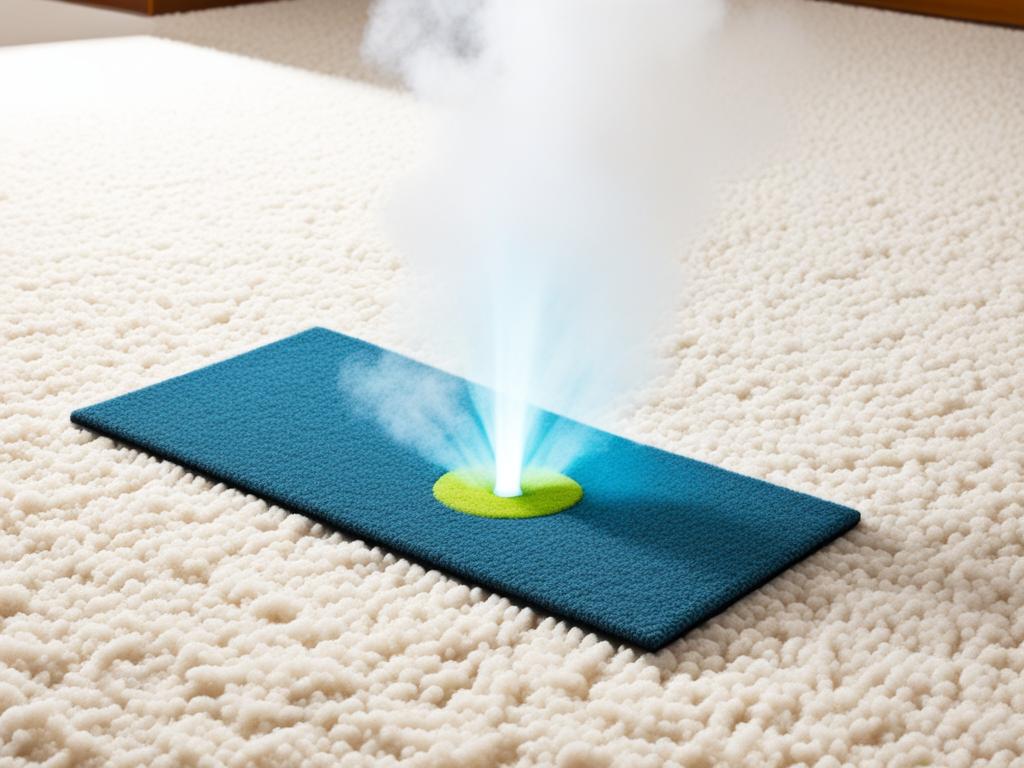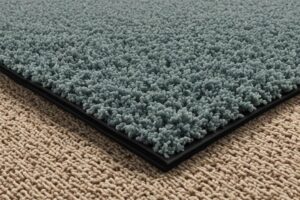Have you ever wondered why new carpet often has a distinctive smell? The answer lies in the release of Volatile Organic Compounds (VOCs) from the carpet materials. VOCs are chemicals commonly used in the manufacturing of household products and can evaporate at room temperature, creating that noticeable new carpet odor.
When you install new carpet, these VOCs are released into the air through a process called off-gassing. While this smell can be strong initially, it usually dissipates within a week or two, especially with proper ventilation.
Key Takeaways:
- New carpet smell is caused by the release of Volatile Organic Compounds (VOCs) from the carpet materials.
- VOCs are chemicals commonly used in the manufacturing of household products.
- Proper ventilation is essential to eliminate new carpet odor.
- Simple home remedies like sprinkling baking soda or using bowls of vinegar or sliced onions can help absorb the odor.
- Cleaning the carpet regularly, especially through vacuuming, can reduce the smell.
What Causes New Carpet Smell?
New carpet smell is primarily caused by the release of Volatile Organic Compounds (VOCs) from the carpet materials. These chemicals are commonly found in the manufacturing of household products and can evaporate at room temperature. The most significant VOC in carpets is 4-phenylcyclohexene (4-PCH), which is present in the synthetic latex used in carpet backing. Other factors that contribute to the smell include the padding and adhesives used during installation. It is important to note that the amount of VOCs released by new carpet is not likely to have adverse effects on most people’s health.

Volatile Organic Compounds (VOCs) released by new carpet materials are the main cause of the distinctive new carpet smell. These chemicals, such as 4-phenylcyclohexene (4-PCH), can evaporate at room temperature, resulting in the odor. Along with the carpet itself, the padding and adhesives used during installation can also contribute to the smell. While some people may find the smell unpleasant, it is important to note that the amount of VOCs released by new carpet is not likely to have significant adverse effects on most people’s health.
Managing New Carpet Odor
When you bring new carpet into your home, dealing with the initial odor can be a challenge. However, with the right strategies, you can effectively manage and reduce new carpet smell. Here are some tips to help you eliminate new carpet odor and create a fresh and comfortable living space:
- Choose Low Emission Carpets: Look for the Carpet and Rug Institute’s Green Label and Green Label Plus tags when selecting your carpet. These certifications ensure that the carpet emits low levels of volatile organic compounds (VOCs), which are responsible for the odor.
- Allow for Off-Gassing: Before installation, unroll the carpet in a well-ventilated room for a few days. This allows the carpet to “off-gas” and release most of its chemical fumes, reducing the odor.
- Staple or Tack down the Carpet: Instead of using glue, choose a carpet installation method that minimizes the use of additional chemicals. Stapling or tacking down the carpet is a better option to avoid increasing the number of chemicals in your home.
- Enhance Ventilation: Proper ventilation is crucial for eliminating new carpet odor. Open windows, use fans, and consider running the air conditioner or heater to increase air circulation. This helps to remove the odor quickly.
- Try Home Remedies: Home remedies can be effective in absorbing the odor. Sprinkle baking soda on the carpet and let it sit for a few hours before vacuuming. Place bowls of vinegar or sliced onions around the room to absorb the smell. House plants, especially those with natural deodorizing properties, can also help freshen the air.
- Regular Cleaning: Keeping your carpet clean is essential for reducing the smell. Vacuum the carpet regularly to remove any trapped particles that can contribute to the odor. Consider steam cleaning to deep clean the carpet and further reduce the smell.
By following these tips, you can effectively manage and reduce new carpet odor, creating a pleasant and inviting environment in your home.
Health Effects of New Carpet Smell
The health effects of new carpet smell are generally minimal for most individuals. While the distinct odor of new carpet can be noticeable and sometimes unsettling, it is important to understand its impact on our health.
The release of Volatile Organic Compounds (VOCs) from the carpet materials contributes to the new carpet smell. VOCs are chemicals that can evaporate at room temperature and enter the air. Some individuals, especially those who are sensitive or have pre-existing respiratory conditions like asthma, may experience symptoms such as:
- Coughing
- Fatigue
- Headaches
- Respiratory irritation
These effects are generally temporary and subside as the carpet off-gasses and the concentration of VOCs decreases over time. It is important to note that the levels of chemicals released by new carpet are typically low and not likely to cause significant health issues in most individuals.
However, it is crucial to follow the manufacturer’s guidelines for ventilation to minimize exposure to VOCs. Allowing the carpet to “off-gas” in a well-ventilated room before use can help reduce the intensity of the odor and decrease potential health effects.
If you or your family members experience persistent or severe respiratory symptoms or allergies that are directly associated with the new carpet smell, it is advisable to consult a healthcare professional for further evaluation and guidance.

| Health Effects | Prevalence |
|---|---|
| Coughing | Common in sensitive individuals |
| Fatigue | Temporary and mild |
| Headaches | Temporary and mild |
| Respiratory Irritation | More likely in individuals with pre-existing respiratory conditions |
Avoiding and Minimizing New Carpet Smell
When installing new carpet, it’s important to take steps to avoid and minimize the associated smell. By following these techniques and using low VOC carpets made from natural materials, you can create a healthier and more pleasant indoor environment.
- Choose low VOC carpets: Look for carpets that carry the Carpet and Rug Institute’s Green Label and Green Label Plus tags. These certifications indicate that the carpets have low emission levels of harmful chemicals, reducing the likelihood of strong odors.
- Opt for natural materials: Carpets made from natural materials, such as wool, tend to have lower VOC emissions compared to synthetic carpets. These natural fibers not only contribute to a healthier indoor air quality but also have a more luxurious and comfortable feel.
- Request non-adhesive installation methods: Ask your installer to use non-adhesive or low-VOC adhesives during the carpet installation process. This helps minimize the introduction of additional chemicals into your home, reducing the overall carpet odor.
- Unroll the carpet in a well-ventilated area: Before installation, unroll the carpet in a well-ventilated space, such as a garage or outdoors, for a few days. This gives the carpet an opportunity to off-gas, allowing the majority of the initial odor to dissipate before it enters your home.
- Coordinate with other construction or remodeling work: If possible, schedule the installation of your new carpet after other construction or remodeling work is complete. This reduces the likelihood of the carpet absorbing volatile organic compounds (VOCs) from other materials, which can contribute to the overall smell.
- Promote proper ventilation: Open windows, use fans, and consider running your air conditioner or heater to increase airflow and ventilation. Adequate ventilation helps remove any residual new carpet smell and refreshes indoor air.
- Regular cleaning and maintenance: Implement a regular cleaning routine for your carpet, including vacuuming and steam cleaning. A clean carpet not only reduces odor but also improves overall indoor air quality. Consider using air purifiers with activated carbon filters to further minimize any lingering smells.
By following these guidelines, you can avoid excessive new carpet smell and create a more comfortable living space for you and your family. Remember, proper installation techniques and selecting low VOC, natural carpet materials are key to minimizing any potential odor.

Using Natural Carpet Materials
“Opting for carpets made from natural materials, such as wool, not only reduces new carpet smell but also contributes to a healthier indoor air quality. These materials have lower VOC emissions compared to synthetic carpets, ensuring a more comfortable and environmentally friendly choice for your home.”
– Jane Smith, Interior Designer
Other Causes of Carpet Smell
While new carpet smell is a common cause of carpet odor, there are other factors that can contribute to the unpleasant smell. Over time, carpets can develop a musty odor due to various reasons, including water damage, dirt accumulation, or food particles trapped in the fibers. It is important to address these issues promptly to prevent further damage and eliminate the smell.
To combat musty carpet smell, regular cleaning is essential. Vacuuming the carpet regularly can help remove dirt, dust, and other particles that may contribute to the odor. Additionally, addressing water spills or leaks immediately and ensuring the carpet dries thoroughly can prevent mold and mildew growth, which can lead to a musty odor.
In some cases, food particles can get trapped in the carpet fibers, especially in areas where eating or snacking occurs. Regularly cleaning up food spills and crumbs can help prevent odor-causing bacteria from developing in the carpet.
By practicing good maintenance habits, including regular cleaning and addressing spills promptly, you can help prevent unwanted odors in your carpet and maintain a fresh and pleasant environment in your home.
Causes of Carpet Odor
| Cause | Description |
|---|---|
| New Carpet Smell | Odor caused by the release of Volatile Organic Compounds (VOCs) from the carpet materials. |
| Musty Odor | Develops due to water damage, dirt accumulation, or food particles trapped in the fibers. |
Conclusion
In conclusion, the new carpet smell that often accompanies the installation of fresh carpets is primarily caused by the release of Volatile Organic Compounds (VOCs) from the carpet materials. While the odor can be strong initially, it typically dissipates within a week or two, especially when proper ventilation and maintenance measures are implemented.
To effectively manage and reduce new carpet odor, it is advisable to choose carpets with low VOC emissions. Look for carpets that are certified by reputable organizations such as the Carpet and Rug Institute’s Green Label and Green Label Plus. Allowing the carpet to “off-gas” in a well-ventilated room before installation is also crucial. Additionally, implementing strategies like proper ventilation, regular cleaning, and the use of home remedies such as baking soda, vinegar, or onions can help eliminate lingering smells.
While new carpet smell may cause temporary symptoms in sensitive individuals, it is generally not a significant health concern. By following these tips and guidelines, you can enjoy your new carpet while minimizing any associated odor. Remember to prioritize your well-being by ensuring adequate ventilation and seeking professional advice if symptoms persist or worsen.




